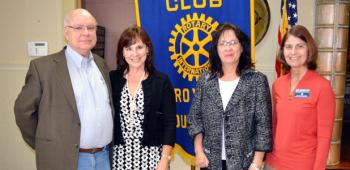
Tetnowski, Shuff discuss Aphasia Center of Acadiana
For anyone who has had a stroke, a head injury, certain vascular diseases and/or dementia, fighting through aphasia has always been a struggle.
Locally, however, there is one place that is helping those with aphasia fight back.
Aphasia, as Jennifer Tetnowski, CCC-SLP, described to the Rotary Club of Crowley Tuesday, not only robs a person of his or her ability to communicate but, in essence, robs them of their identity.
Aphasia is defined as an impairment that can affect one’s ability to speak, understand what is said and the ability to read or write. It always is due to an injury to the brain resulting most commonly from a stroke as well as head trauma, brain tumors or from infection.
The Aphasia Center of Acadiana, Inc., was founded and filed for 501(c) status in 2010 by executive director Rose Shuff, after she suffered a stroke and then aphasia. It was due to “fast” treatment that not more damage was done to Shuff’s brain and that after exhausting her rehabilitation options realizing that many are not as fortunate as her.
The need in the state of Louisiana is also well noted as the state currently ranks toward the top of the country with its stroke rate — well above the national average.
With that in mind, “FAST” treatment is critical for everyone to know, according to Tetnowski.
FAST (face, arms, speech and time) is the easiest thing to keep in mind when it comes to treatment and recognizing if a person is having a stroke.
If the person’s face is dropping on one side, if he or she cannot raise their arms equally or if their speech is slurred, he or she may be having a stroke, making time critical.
To reduce the effect on the brain and to make sure medication can have its optimal effect, a TPA (tissue plasminogen activator) needs to be administered within the first two hours.
Shuff knows the importance of timing and credits it and the TPA for her life and how she’s able to live it today.
“Had it not been for TPA, I’d be in a nursing home,” she said.
Though she still struggles with finding her identity, since she can no longer work and only volunteers, Shuff enjoys being able to socialize and be involved in the community thanks to her family and friends and thanks to the intense therapy that helped her regain her ability to walk and talk.
“Some people are not given that opportunity,” she said, speaking of the benefits of aphasia therapy.
It was recovery from that stroke, back in 1996, that helped Shuff begin her journey to create the Aphasia Center of Acadiana.
The Aphasia Center of Acadiana, in turn, has been helping many that start their treatments in the hospital and move onto clinics but still are in need of treatments.
The group offers informational counseling for individuals with a neurogenic communicative disorder and with his/her family, monthly aphasia support group, neurogenic communicative disorders informational outreach, therapy services for communicative impairments and assistance with referrals for other services not yet offered by the center.
In the future, the center hopes to initiate more support groups outside of the one in Lafayette, start a book club soon and grow the number of social activities it and its participants can enjoy.
The Aphasia Center of Acadiana, Inc., is currently housed in and collaborates with the University of Louisiana at Lafayette’s Department of Communicative Disorders, located in Burke-Hawthorne Hall. They can be reached at 337-482-6721.
For more information on aphasia, please visit the National Aphasia Association’s website, aphasia.org.
- Log in to post comments
